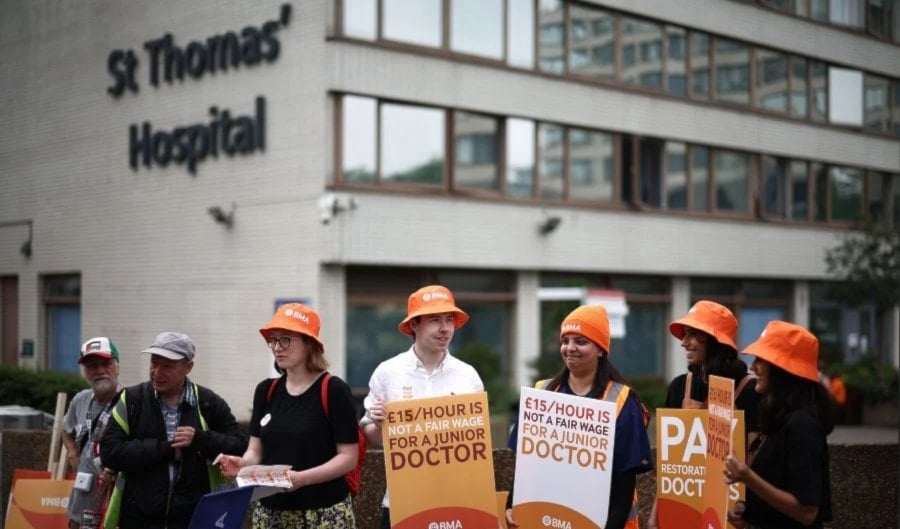England hospital doctors stage strike ahead of general election
The doctors say they will call off the strike if UK Prime Minister Rishi Sunak meets their demand of a 35% "pay restoration."
-

Junior doctors in England striking one week before the UK's general election to increase pay, June 27, 2024. (AFP)
Junior hospital doctors in England began a five-day strike on Thursday, one week before the UK's general election, to protest their underpayment and the publicly-funded National Health Service's (NHS) state.
The doctors said they will call off the strike if Prime Minister Rishi Sunak meets their demand of a 35% "pay restoration" amid the country's current cost-of-living crisis and high inflation.
The Conservative government has stated that the doctors' demands are unaffordable due to stretched public finances. Although the Labour Party's Health spokesman Wes Streeting said a potential Labour government would also not be able to cater to the doctors' request, he stated there is "space for a discussion."
The NHS is facing significant challenges stemming from the COVID-19 pandemic, causing an immense backlog in the institution's operations, including surgery and cancer treatment delays, lack of resources, and long waiting periods. These issues have led to constant doctors' strikes and public dissatisfaction.
In a recent survey released in March 2024 where over 3,000 UK citizens were questioned, 52% of the respondents were dissatisfied with the NHS, while 24% were satisfied with the institute's services. The satisfaction rate immensely dropped after the pandemic.
Decline in the UK's healthcare system
The UK has long been embroiled in issues surrounding its health policy, with a study conducted by the Institute of Health Equity at University College London unveiling a staggering toll of over a million premature deaths taking place in England over the course of a decade.
The research, titled Health Inequalities, Lives Cut Short, attributes this alarming figure to a combination of poverty, austerity measures, and the impact of the COVID-19 pandemic.
Between 2011 and 2019, 1,062,334 individuals died earlier than they would have if they were living in areas where the richest 10% of the population did. Additionally, the study reported 151,615 premature deaths in 2020, with a notable spike attributed to the COVID-19 pandemic.
Professor Peter Goldblatt, the study's author, directly linked 148,000 deaths to austerity measures implemented since 2010, comparing them to earlier levels. The findings underscore the stark economic and social inequalities leading to premature deaths, primarily from cancer, heart problems, and other diseases affecting the most vulnerable populations.
This comes as England's public health provider, the NHS, faces mounting crises, induced by a lack of government funding, culminating in low wages, a lack of equipment, and worsening services.

 3 Min Read
3 Min Read








